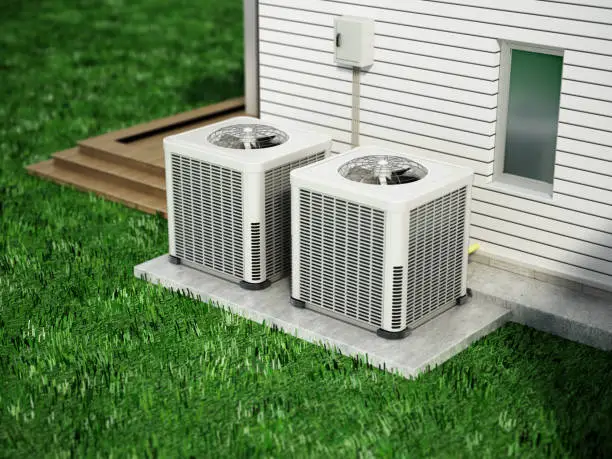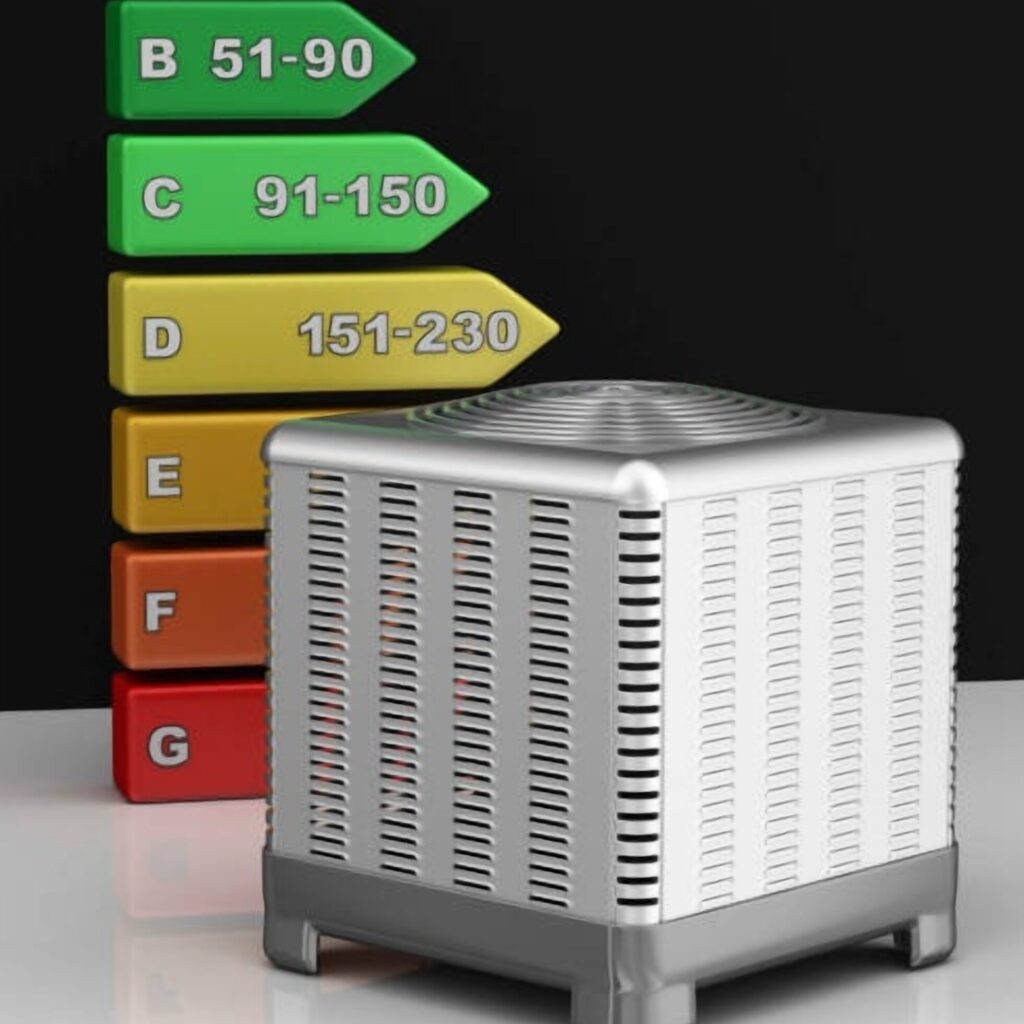
Introduction
Are you considering an eco-friendly heating solution for your home? Heat pumps are fast becoming a popular choice due to their energy efficiency and potential savings on heating bills.
In this article, we’ll delve into the running costs of heat pumps, compare them with traditional heating systems, and explore ways to maximise the benefits of this renewable technology.
Key Takeaways
- Heat pumps are an energy – efficient alternative to traditional heating systems, and their running costs may vary depending on several factors such as size, efficiency, and climate.
- Comparing different types of heating systems based on their running costs should consider the size of your home, insulation quality, fuel prices and maintenance expenses over time. The initial installation cost may be offset over time by long-term savings in energy bills.
- Regular maintenance and cleaning can improve heat pump performance while upgrading to a more efficient model with a higher SCoP rating can lead to significant savings on electricity bills over time. Using a programmable thermostat alongside proper insulation management further helps reduce heat pump running costs.
Understanding Heat Pumps And Running Costs
Heat pumps are an energy-efficient alternative to traditional heating systems, but their running costs can vary depending on the size of your property, its level of insulation and climate.
Factors That Affect Running Costs (Size, Efficiency, And Climate)
Several factors influence the running costs of your heat pump, such as size, efficiency, and climate. For instance, a well-sized heat pump can provide optimal performance without consuming too much energy.
Efficiency plays a crucial role in determining the cost-effectiveness of any heating system. Heat pumps with higher efficiencies convert more of their input energy into useful heat for your space.
This scenario means that efficient models can significantly reduce energy consumption and ultimately lower your yearly expenditure on utilities. Climate also impacts how hard your heat pump has to work – those living in harsher climates will require increased power to keep homes warm during winter months compared to milder regions where heating demands are less extreme.
Comparing Running Costs With Other Heating Systems
When it comes to choosing a heating system for your home, one important factor to consider is the running costs. Heat pumps are often touted as an efficient and cost-effective alternative to traditional heating systems such as gas boilers or electric radiators.
However, it’s important to keep in mind that every situation is unique and there may be other factors at play that could affect running costs. For example, the size of your home and how well insulated it is will impact how much energy your heating system needs to consume in order to maintain a comfortable temperature.
Climate also plays a role – homes in colder regions may require more energy than those in milder areas.
Ground-Source Heat Pumps
Ground-source heat pumps are another popular type of heat pump, which use geothermal energy to provide heating and cooling.
Average Running Costs In The UK
The average running costs of a heat pump in the UK depend on the type of system you choose. Ground-source heat pumps are typically more expensive to install but have lower running costs due to their higher efficiency, with typical annual running costs ranging between £400-£1,500 if used for both heating and hot water.
It’s important to note that these figures will vary based on factors such as the size of your home, your climate zone and how well-insulated your property is.
Estimated Annual Heat Demand
To estimate your annual heat demand, you need to consider how much energy your house consumes in a year. This depends on many factors, such as the size of your home, the number of occupants, and the climate.
In general, houses located in colder areas require more heat than those in warmer regions.
For instance, say your house has two bedrooms and one bathroom with a total area of 80 square meters (m²), and two adults live there. To maintain indoor comfort during winter months when outdoor temperature drops to -5°Celsius (°C), it may consume about 12 kilowatts per hour (kWh) daily or around 4,380 kWh annually.
Air-Source Heat Pumps
Air-source heat pumps are a popular choice for homeowners looking to reduce their heating bills and carbon emissions, with average running costs in the UK ranging from £650 to £1,200 per year depending on the size of the property and climate.
Average Running Costs In The UK
One of the main factors that affect heat pump running costs is location. In the UK, ground-source heat pumps are estimated to cost anywhere between £700 and £1,300 per year to run, while an air-source heat pump can cost around £800 to £1,500 annually.
However, these are just ballpark figures as various other factors come into play such as insulation quality and property size. By all accounts though, when compared to conventional heating systems such as oil or gas boilers, a typical household could save hundreds of pounds every year on their energy bills by switching to a renewable energy source like a heat pump.

Calculating Running Costs
Calculating the running costs of a heat pump can seem daunting, but it’s essential to understand how much you’ll be spending on energy bills. This is especially true when switching over from traditional heating systems like boilers or electric heaters.
To calculate running costs accurately, you need to consider both fixed and variable costs. Fixed costs are those that don’t change regardless of how much energy you use – this includes monthly standing charges for connection to the grid.
To get an idea of how much you can expect to spend each year on running your heat pump, start by looking at its seasonal performance factor (SCoP). SCoP is a measure of efficiency averaged out over the year, which determines how much energy output you receive per unit input.
You can then estimate annual electricity usage based on average annual heating demand for properties like yours in your area as well as local electricity tariffs.
Tips To Reduce Heat Pump Running Costs
Reduce your heat pump running costs with these simple tips. Keep up with regular maintenance and cleaning, upgrade to a more efficient model, use a programmable thermostat, improve insulation, and seal air leaks.
Regular Maintenance And Cleaning
To keep your heat pump running efficiently and prevent breakdowns, it’s essential to schedule regular maintenance and cleaning. This means booking an annual service with a qualified engineer who can inspect the system, clean the filters and coils, lubricate moving parts, check refrigerant levels, and troubleshoot any issues.
Additionally, you should clean or replace your air filter every one to three months depending on usage.
By keeping up with maintenance, you’ll not only save money on repair costs but also maintain optimal efficiency throughout the year. Remember that even small problems like loose wires or dirty coils could lead to bigger problems if left untreated.
Upgrading To A More Efficient Model
One effective way to reduce your heat pump’s running costs is by upgrading to a more efficient model. Newer heat pumps are designed to consume less energy while delivering better performance than older models.
When shopping for a new unit, look for models with high SCoP (Seasonal Coefficient of Performance) This rating indicates how much energy the heat pump uses in relation to its output.
Additionally, consider opting for an eco-friendly refrigerant like R410a instead of the traditional R22 refrigerant that has been phased out due to environmental concerns.
While upgrading may come with some upfront costs, you’ll recover these expenses through lower electricity bills and reduced maintenance costs in the long run.
Using A Programmable Thermostat
To help reduce your heat pump running costs, consider using a programmable thermostat. With this device, you can set different temperature settings for specific times of the day or week.
This not only saves energy but also reduces wear and tear on your heat pump system. Programmable thermostats are easy to install and use and can save you up to 10% on your heating bills per year.
Make sure to read the manufacturer’s instructions carefully before installation or consult with an HVAC professional if needed.
Improving Insulation And Sealing Air Leaks
One of the biggest contributors to high heat pump running costs is poor insulation and air leaks. If your home has drafts, then you’re losing valuable heat – and money – through those cracks and gaps.
Of course, improving insulation isn’t just about sealing visible gaps. Your roof, walls, floors, and windows all play a part in keeping your home warm, so it’s worth considering whether there are upgrades you could make to these areas too.
For example, adding loft insulation or double glazing can improve energy efficiency across the whole property.
Switching To A Heat Pump
By switching to a heat pump, you can potentially save up to £1,200 per year in energy bills compared to traditional heating systems like gas boilers. Additionally, there are various available tariffs and funding options to help with the installation costs of heat pumps.
Potential Cost Savings
Switching to a heat pump can offer significant cost savings compared to traditional heating systems. While installation costs may be higher, the long-term efficiency of a heat pump means lower energy bills and potentially faster payback on your investment.
Some estimates suggest that homeowners could save up to 50% on their annual heating bills by switching from an oil or gas boiler to a heat pump.
Additionally, there are potential tariff benefits for those who make the switch to renewable energy sources like heat pumps. The Renewable Heat Incentive (RHI) scheme offers payments for eligible installations, providing extra financial incentive for homeowners looking to reduce their carbon footprint and save money at the same time.
Available Tariffs
If you’re thinking of switching to a heat pump, it’s worth considering the available tariffs that could help you save money on your energy bills. Tariffs vary depending on the supplier and location, so it’s always best to shop around for the best deal.
Another option is the Renewable Heat Incentive (RHI) scheme which is designed to encourage homeowners and businesses to switch to renewable heating solutions such as heat pumps.
The RHI scheme provides quarterly payments based on how much renewable heat your system produces, which can last up to seven years. However, keep in mind that some eligibility criteria must be met before applying for this scheme.
Maintenance Costs
Maintaining your heat pump is an important aspect of keeping your running costs low. Regular maintenance checks can help spot small problems before they become bigger and more expensive to fix.
It’s recommended that you have a professional service your system at least once a year, ideally before winter sets in. Some things that might need checking include the refrigerant levels, electrical connections, filters and the outdoor unit’s coil cleaning.
Additionally, it’s important to keep your heat pump clean and free of debris such as leaves or twigs which can clog airflow into and out of the system. A dirty or blocked air filter also lowers efficiency which leads to higher energy consumption resulting in increased utility bills over time.
Conclusion
In conclusion, when it comes to heating your home, investing in a heat pump can be an energy-efficient and cost-effective solution.
Factors such as size, efficiency, climate and maintenance all play a role in determining the running costs of a heat pump.
By taking steps to reduce your heat pump’s running costs such as upgrading to a more efficient model or using a programmable thermostat you can also save money on your energy bills.
Switching to renewable heating technology will not only help you cut down carbon emissions but also provide significant savings on fuel expenses over time making it one of the best eco-friendly solutions available today!
